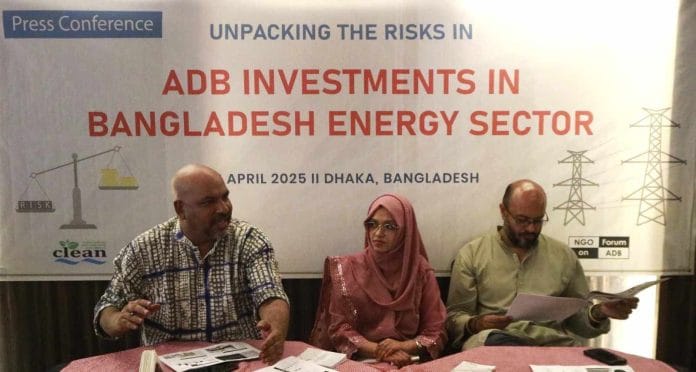The Asian Development Bank (ADB) is under sharp criticism from civil society organizations over its US$17.34 billion investment in Bangladesh’s energy sector, the vast majority of which supports fossil fuel-based projects.
The findings were presented on Tuesday at a press conference titled “Unpacking the Risks in ADB’s Investments in Bangladesh,” held at Banglamotor in Dhaka ahead of ADB’s 58th Annual General Meeting.
The event was jointly organized by the NGO Forum on ADB and the Coastal Livelihood and Environmental Action Network (CLEAN).
Speakers accused the multilateral lender of exacerbating Bangladesh’s energy and environmental crises by continuing a one-sided investment approach that prioritizes fossil fuels over renewable alternatives.
According to an analysis by the NGO Forum on ADB, the bank has supported 106 energy projects in Bangladesh since 1973. A substantial portion of this funding has gone toward fossil fuel-based power generation, oil and gas distribution, and related transmission infrastructure. Of these projects, 67—valued at $9.84 billion—have already been closed, raising serious concerns about the bank’s project planning, long-term sustainability, and strategic direction.
The analysis also reveals that 65% of ADB’s energy investments in the country—amounting to $11.36 billion—lack any safeguard classification, highlighting critical transparency and accountability issues. Only 7.95% of project funding has been allocated to high-risk environmental safeguards, while a mere 0.35% (or $60.58 million) has been set aside for resettlement and community protection measures.
“These figures cast serious doubt on ADB’s commitment to sustainable development,” said Sharmin Bristy, Fossil Fuel Campaigner at the NGO Forum on ADB.
Rayyan Hassan, Executive Director of the NGO Forum on ADB, highlighted the stark disparity in ADB’s funding allocation: “Of the $4.88 billion ADB has invested in electricity generation in Bangladesh, 82.9% went to fossil fuel-based projects. In contrast, just 2.55% went to solar energy—and not a single dollar was invested in wind power. The cost per megawatt is also telling: fossil fuel projects receive $2.04 million per MW, while solar receives just $0.51 million.”
He added, “ADB must undergo an urgent policy overhaul to embed a proactive fossil fuel phase-out strategy, champion a just and equitable energy transition, align financing with the Paris Agreement to prevent carbon lock-in, prioritize regionally viable clean energy solutions, and decisively shift away from fossil fuel dependency to uphold environmental integrity and meet global climate goals.”
Hasan Mehedi, Chief Executive of CLEAN, criticized ADB’s investment in a 165-kilometer gas pipeline from Bheramara to Khulna, despite the fact that Bangladesh lacks a sufficient natural gas supply.
“Relying on imaginary gas,” he said, ADB further funded two gas-based power plants in Khulna with capacities of 225 MW and 800 MW. Due to persistent gas shortages, these projects have remained idle for years—becoming a burden on the people. “As a multilateral development bank, ADB should not be engaging in such irresponsible and unsustainable projects,” he emphasized.
“Bangladesh is on the frontlines of the climate crisis,” Mehedi continued, “yet ADB continues to finance fossil fuel projects that increase our vulnerability and rob us of a livable future. ADB must revise its energy policy and commit fully to renewable energy sources.”
At the event, CLEAN and the NGO Forum on ADB presented three key demands to the bank:
- End all fossil fuel financing and support a just energy transition.
- Implement robust safeguards that include Free, Prior, and Informed Consent (FPIC) and respect for human rights.
- Reject carbon markets, greenwashing practices, and corporate-led pseudo climate solutions.

